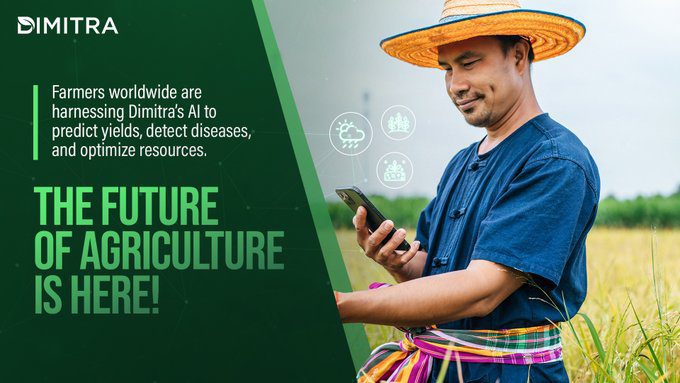AI in Agriculture: A New Era
Farmers worldwide are harnessing Dimitra’s AI to predict yields, detect diseases, and optimize resources. The future of agriculture is here! The integration of Artificial Intelligence (AI) in agriculture is not just a trend but a revolution. AI technologies are transforming traditional farming practices, making them more efficient and sustainable.
Predicting Yields and Detecting Diseases
One of the significant applications of AI in agriculture is predicting crop yields. By analyzing various data points such as weather patterns, soil conditions, and crop health, AI can provide accurate yield predictions. This helps farmers make informed decisions about planting and harvesting. Additionally, AI-powered tools can detect diseases in crops early, allowing for timely intervention and preventing large-scale crop loss.
Optimizing Resources
AI tools are also instrumental in optimizing the use of resources such as water, fertilizers, and pesticides. For instance, AI-powered sensors can monitor soil moisture levels and provide recommendations on the optimal amount of water needed for irrigation. This not only conserves water but also ensures that crops receive the right amount of hydration. Similarly, AI-based software for managing cattle is helping livestock farmers monitor animal health, automate feeding schedules, and improve herd productivity.
Case Studies: Traive and Cropin
Companies like Traive and Cropin are at the forefront of the AI revolution in agriculture. Traive has launched a platform that uses AI to analyze agricultural data and assess risk for lenders, giving farmers easier access to credit. This platform has facilitated nearly $1 billion in financial operations, showcasing the potential of AI in transforming the financial aspects of farming. Latin American AI startups transform farming.
Similarly, Cropin has launched Sage, an agri-intelligence solution powered by Google’s Gemini. Sage leverages AI to analyze agricultural data, predict yields, and optimize crop production. This tool aims to transform global food systems and achieve climate goals through its AgTech solutions. Google-backed Cropin Sage’s grid-based agricultural map.
Sustainability and ESG
AI is playing a crucial role in promoting sustainability in agriculture. By optimizing resource use and reducing waste, AI helps farmers adopt more sustainable farming practices. This not only benefits the environment but also improves the economic viability of farming. AI tools are also helping farmers manage climate risks and produce more sustainably, contributing to global food security.
Global Impact and Future Prospects
The global impact of AI in agriculture is significant. With the world’s population expected to reach nearly 10 billion people by 2050, the demand for food is increasing. AI provides farmers with tools to increase yields, manage risks, and operate more sustainably. This has the potential to improve access to credit for farmers and contribute to global food security.
Related Articles
- Dimitra Revolutionizing Global Agriculture with AI and AgTech
- Exploring Strawberry AI Dyr: Your 24/7 AI Market Analyst
- Empowering Tanzanian Agriculture with AI: Dr. Theofrida Maginga’s Mkulima GPT
- VentureMindAI: Revolutionizing Productivity with Advanced AI Tools
- Why AI is Not a Threat to Knowledge Workers

Looking for Travel Inspiration?
Explore Textify’s AI membership
Need a Chart? Explore the world’s largest Charts database
